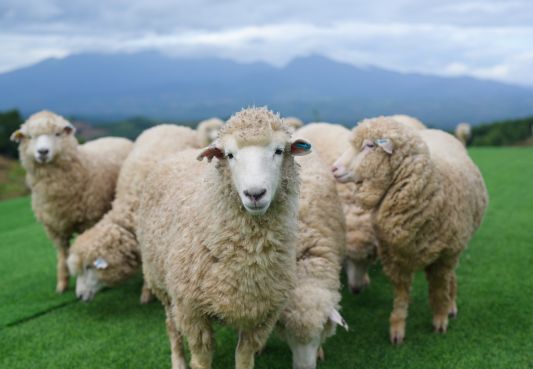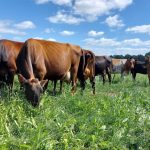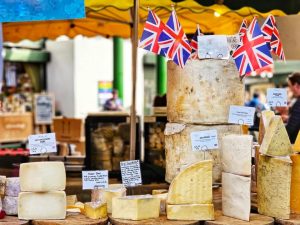
Surge of interest in British sheep’s milk cheese
Sheep’s milk cheesemakers in the UK say they are struggling to keep up with increased requests for their products due to a nationwide shortage of milk.
Owen Davies, of Ty Caws in Cardiff (a cheesemonger which has recently started to produce sheep’s milk cheese), says more needs to be done to support the industry, and adds that investment in sheep’s milk could be lucrative for farmers due to heightened demand.
“The price for sheep’s milk is 3.5 times more than cow’s,” he explains. “There is a premium there, and there is a huge demand for sheep’s milk, sheep’s milk cheese, and even sheep’s milk yoghurt. Beyond this, we’re seeing, in places like New Zealand, sheep’s milk being bought up by China to be used in baby milk formula because they are intolerant to cow’s milk. There is a market for it, but at the moment here, it’s hard to get hold of.”
Owen has been crafting cheese at Food Centre Wales, a funded development site where he’s been able to research and create products with support. “I said to them I wanted to focus on sheep’s milk cheese. Wales is a country of sheep, but we don’t actually make many sheep’s milk cheeses ourselves, and we have a number of customers who are switching from eating cow’s milk cheeses to sheep’s milk and goat because of intolerances. Apparently, sheep’s milk is the closest to human milk, and it’s easier for us to digest.”
Owen says they were lucky enough to find a farmer last year in Pembrokeshire who was able to supply them with good quality sheep’s milk. “But when we came to make cheese this year, that farmer had decided not to produce it anymore.”
This will be a familiar dilemma for other makers. “It is very very difficult to find sheep’s milk in Wales, but we did manage to find a small farmer in mid to North Wales, who has 36 dairy sheep. However, it is very small scale.”
Owen says he is pleased the Welsh government is in the process of setting up a sheep’s milk dairy in the country to support the industry, but adds there is still work to be done to ensure the strengthening of what could be a valuable market in the future.

British cheese trends for 2024
Tim Collings, area sales manager at Rowcliffe, spends a great deal of time talking to retailers in the speciality sector, and says he’s noticed several distinct trends across the last 12 months.
“Firstly, speaking to customers, sheep’s and goats’ cheeses are being asked for a lot more now, certainly this year. It’s not a great time for them to be in demand because there’s scarcity, especially of sheep’s milk cheese, but they have remained incredibly popular.”
In artisan retail Tim says ‘newness’ is a factor too. “Customers are telling me they’re constantly being asked ‘what’s new?’, and they’re really having to push on innovation and new products more than ever before. I think it’s a sign of a really good deli that people want to come in and push the boundaries a bit more.”
A third noticeable trend is the spike of interest in organic and regeneratively farmed cheeses. “We recently launched Organic Herd and Golden Hooves cheeses. They’ve both got that ethos and that story to tell behind them, it’s really quite interesting. We’ve also just launched with cheeses from The Ethical Dairy in Scotland. They leave their calves with the cows and can’t rely on a specific yield. It’s all down to happy cows. Their Fleet Valley Blue is really good.”
Next up is pairings. “More and more people are asking about pairings. ‘What pairs with this cheese or this chutney or this wine?’ And what is becoming apparent is people are looking for ideas for what they can do with a cheese, whether it’s melting or grilling it, or the recipes they can make with it, rather than just having it on a cheese board.”
Finally, Tim says sales of Alpine-style cheeses are strong. “They are just so diverse and great all-year-round. They go tremendously well in winter time for grilling, but the floral nature of Alpine cheeses lends them to lighter summer dishes as well.”
Research shows UK shoppers are becoming cheese connoisseurs
Recent data, gathered by The Knowledge Bank (part of Scotland Food & Drink) has highlighted a renaissance in the cheese retail market as consumers explore new varieties.
Anne-Laure Farrar, The Knowledge Bank’s UK market insight manager, says, “Cheese has maintained a strong position in the UK retail market despite the ongoing financial challenges posed by inflation. Consumers are still opting for traditional favourites, however there is clear evidence that tastes are diversifying.”
Arguably the most notable statistic in the report is the resurgence and growth of specialty brands (up 12% across all channels) representing a massive opportunity for artisan producers. Data shows the increasing desire to cook at home has proved a fruitful environment for this growth as consumers seek to recreate the restaurant experience.
This changing preference has also been noted by Paul Grant, chairman of the Scottish Dairy Growth Board (SDGB), as British cheese brands benefit from harsher and costlier conditions on importing cheese, forged by Brexit and the current financial climate.
“The importation of European products is not as simple as it used to be,” Paul says. “There is opportunity for UK artisan cheese makers to replace some of these European products that have traditionally established themselves in the market.
“It’s critically important that the quality and standard of the cheeses meets consumers’ aspirations, and we seem to be doing that, which is very encouraging. There is a momentum, if you like, and I don’t think that interest is going to dwindle as long as the service and quality delivers.”
The report states the increasing cost due to inflation hasn’t hampered the local market, with consumers showing they are happy to spend more for a product they deem to be of higher quality, for instance organic specialty cheese, which is growing ahead of standard specialty in grocery retail, crucially both in value and volume (though from a small base).
In a unique twist, certain cheese products have experienced a rise in popularity thanks to the power of social media.
Anne-Laure explains, “The importance of viral trends cannot not be denied, and seeing some varieties blow up in popularity thanks to TikTok and Instagram is wonderful, as long-established products gain a new audience.”
One beneficiary of this virality is cottage cheese after its popularity surged with younger, health-conscious consumers who have been transformed it into almost anything, from cookies to ice cream.
Sales across the UK reflect this, with cottage cheese outperforming other soft cheese varieties in growth – representing 11.6% in sales and 10.7% and volume respectively.
Stirlingshire-based Graham’s Family Dairy has recently noted a 40% rise in cottage cheese sales – to levels not seen since the 1980s – and attributed them to rise in demand for high-protein products, retro trends and social media.
The research also highlighted some disparities in cheese choices by consumers based on their age profile. Cheddar remained the favourite option UK-wide, with 69% of shoppers claiming they had bought it in the last three months. Cheddar was also the favourite of older consumers, but younger consumers favoured continental soft cheeses such as Brie or Mozzarella. Middle-aged consumers were the most likely to buy goat and sheep cheese varieties such as Feta and Halloumi.
Anne-Laure says, “The nation’s love for cheese has not been dampened by the current financial climate and it’s great to see the retail market remain stable during this time.
“But what is most promising is how brands are adapting to this changing landscape to seek out new opportunities and audiences for their products.”
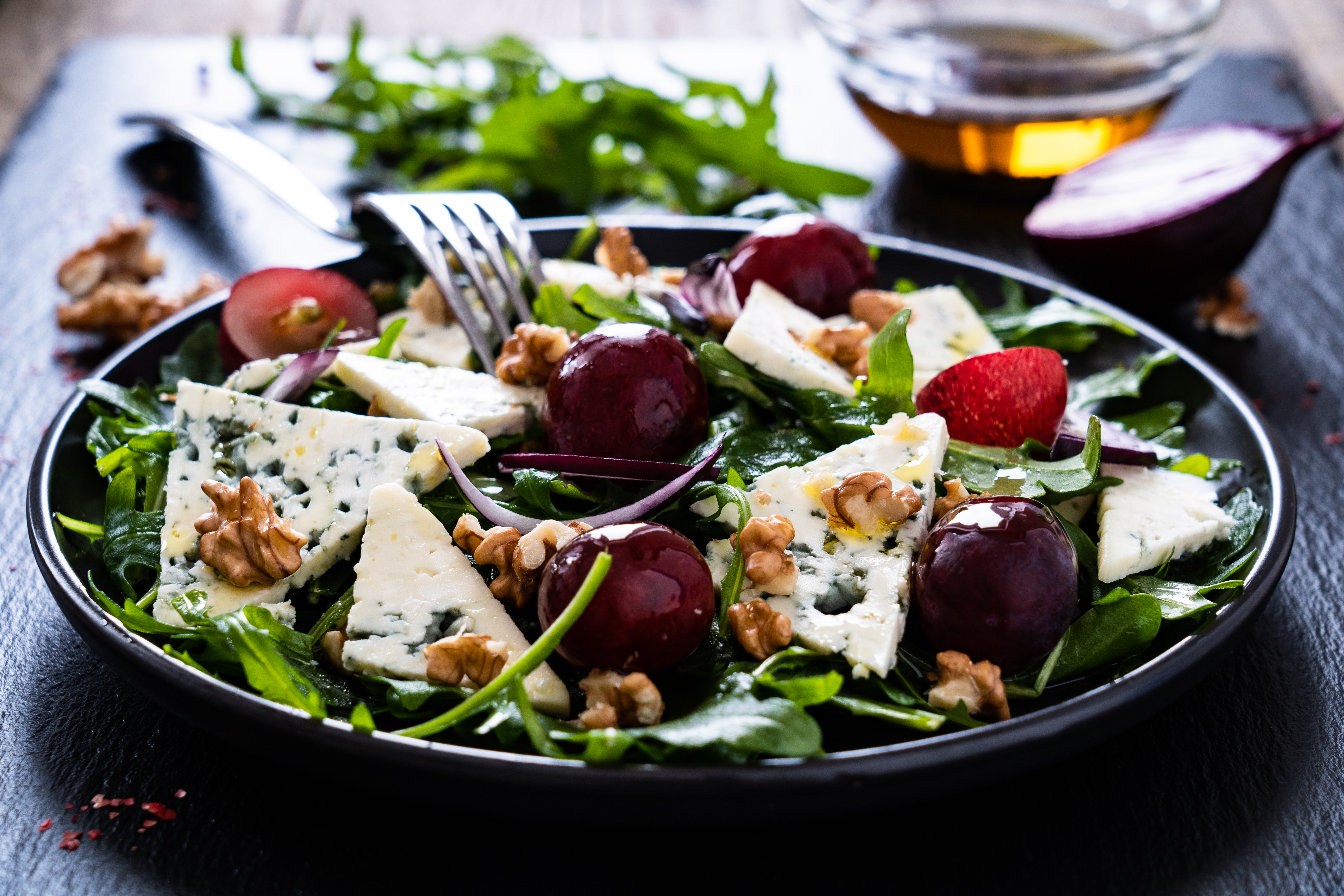
Making blue cheese a warm weather hero
The likes of Stilton are often relegated to the cheeseboard as ‘the blue option’ everyone ‘should’ include. But investment in new-look blues, and new formats aimed at year-round eating occasions, is stimulating the market, according to insiders.
The folk at Clawson say despite the unseasonable British weather, sales of its new premium Stilton slices (ideal for burgers, pizzas or even posh cheese on toast) are up 33%. This is an upward trajectory other makers are reporting too. Clear investment is being made by those in the speciality sector into this profitable space, giving them access to a new generation of shopper, dipping their toes into the artisan world.
“Our passion is to inspire consumers to eat Stilton at all times of the year,” says Clawson’s Nikki Matthews. “A trend we’re seeing at the moment as the cost of living is on everyone’s lips, is that people are eating at home more often, while pubs and restaurants remain more expensive than they used to be.
“At the weekends they’re looking for something special, or to recreate a meal within their own kitchen.” Gourmet burgers are one of the treats they’re making, and premium burger melts fit in with their aspirations to bring the ‘steakhouse’ experience home.
“If you’re at the cheese counter, why would you buy a block of cheese to put on top of a burger? It can be a bit intimidating,” says Nikki, “which is why we think we’re seeing success with our product. It’s the ideal solution. And if consumers discover our melts at the counter and they enjoy them, it could well encourage them to come back and try a bigger piece, or experience another cheese.”
Retailers shouldn’t be afraid, Nikki adds, to introduce premium slices alongside their cutting cheeses. “They have to cater to a lot of different consumers and tastes…to anyone who might visit their counter. There will be those who are not that interested, and purely want a cut from the whole cheese but, also, we’re seeing there is a large number of people looking for convenience, who want us to make life easy for them, and we’re here to give them inspiration.”
Another trend Nikki says Clawson is noticing is an increase in flexitarianism – restricting meat consumption to just a few days per week. “Some people are putting cheese at the centre of their meals instead, and there’s so much they can do with blue cheese. It’s slightly salty, and deliciously creamy with a distinctive blue bite. A lot of people we’ve spoken to say they will use it instead of salt – it doesn’t have to be the main part of a dish.”
Clawson launched its 1912 Stilton in 2022, and simultaneously released lots of recipes online to serve as inspiration for shoppers, acting also as a hub cheesemongers can point their customers to, to help them enjoy blue cheese whatever the weather. “We have recipes for tarte tatins, classic salads, pizzas,” says Nikki. “Blue cheese isn’t just there for, say, a Stilton and broccoli soup, or steak and Stilton pie, it can actually be used much more creatively. Its blue tang is so versatile.”
‘Let’s give organic cheese the attention it deserves’
Feltham’s Farm co-founder Penny Nagle’s newly formed Organic Cheesemakers’ Network is going from strength to strength as it continues to attract interest from makers across the UK.
There is much work to be done, Penny says, to preserve the future of organic cheese and dairy, and to ensure producers continue to have a voice…one that is being heard.
“We think there needs to be a bit of research done, certainly by The Specialist Cheesemakers Association and the Soil Association,” she explains. “There’s a whole movement about regenerative farming and Net Zero and rewilding. And what we’re saying is, we’ve got organic cheeses here, and we’re thinking about all of those things too. There’s an almost untold story about how good organic milk is.”
Organic cheesemakers, Penny says, are wholly undervalued by the market currently. “If you farm organically or, like us, buy organic milk from a single source herd, it costs a third more. Everything has to be organic or the best quality, and often organic cheese is sold at the same price as other standard cheeses.”
From Penny, the message is more needs to be done to engage consumers with organic cheese at a time when “it’s so confusing for them. They are being told to think about regenerative farming, but what does that mean? There are a lot of variables there, but with organic, we have farm audits, and have to show our invoices to prove we’re not using chemicals, and to demonstrate animal welfare and our commitment to biodiversity.”
Alongside lack of visibility to consumers, Penny says other ongoing concerns include that a number of makers are producing cheese organically but not certifying, and cheesemongers aren’t necessarily thinking about organic when they curate their stock lists.
“There’s definitely a market for it. There’s a big movement from the Soil Association to say organic food is as accessible as any other handmade artisan food. That’s certainly the message we want to send.”
Jessica Kimber Holloway at Godminster agrees that consumer education around organic is poor. “With organic you can read the standards, and understand the animal welfare and the requirements. You should know what you’re buying into and why you’re paying a premium,” she explains.
Jessica is saddened that organic seems to be increasingly left out of the speciality conversation, with some farmers and makers choosing not to certify which, she thinks, has an impact on all organic producers. “We used to lead with organic as our main USP,” she says. “But we don’t any longer because it can have negative connotations. There can be that expectation that it’s too expensive, but actually it is often priced like for like alongside non-organic artisan cheeses. I think those who remain organic will be able to charge a good premium for their products because organic is in demand. We need to shout about the value of organic!”
Penny adds that consumers are increasingly looking at improving their diets, choosing local, organic and non-UPF, and that the main barrier is gaining access to these shoppers – something that retailers can certainly help with.
Any organic dairy or cheesemaker is welcome to join the network, she adds, to strengthen the cause.
“We want to have chats with other makers, to keep the dialogue going, and to talk about all the ongoing issues we have as a group.”
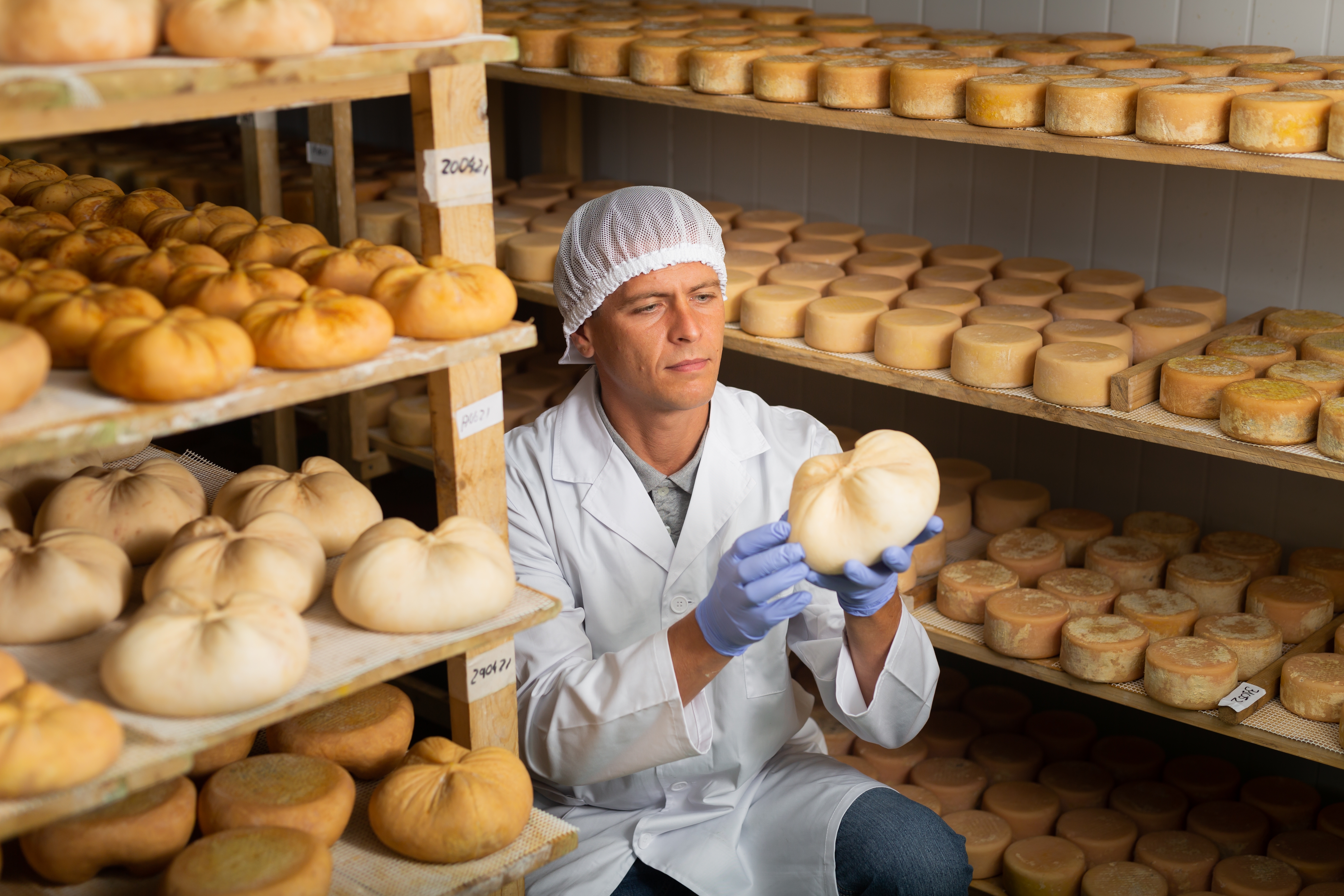
‘Sharing our knowledge has never been more important’
The skill and expertise of cheesemakers, particularly those who have been in the industry for a long time, is something that has long been taken for granted. What happens when those people retire or die? Where do their hand-written or well-remembered notes and treasured recipes go?
The answer is, they’re often lost. Too many heritage cheeses have fallen to the wayside through lack of succession planning, and it’s one of the greatest tragedies of the British food and drink scene, says cheesemonger Andy Swinscoe of The Courtyard Dairy.
Andy is incredibly active and vocal in the world of cheese, helping makers revive and restore traditional practices, and products that would otherwise be long forgotten. This year he set up the Northern Dairy Cheese School as a way to formalise his thoughts, while bringing together others like himself, who are frustrated by the lack of technical support in the UK. A kind of ‘neighbourhood phone tree’ for the cheese industry.
The raison d’etre for the school is to share ideas, discuss techniques, try out different methods, and generally upskill the current and incoming generation of cheesemakers.
“That spread of knowledge is key,” Andy explains. “There is no technical support here really, but many of the problems cheesemakers have are easy to solve. Like the way your wash system works. A lot of people are open to helping others, and you can learn so much from those who’ve got experience.”
In years gone by, he says, there would have been old fashioned dairy schools in the regions, or neighbours making similar cheeses across a hedgerow. “If you had a problem, you could chat to the people next door to see how they might solve it. We just don’t work like that anymore.”
It’s Andy’s hope that by bringing together makers, across a series of events, those vital details and nuggets of advice that make the difference between a good cheese and an exceptional one, might be shared. “We’re such a small industry,” he adds. “It’s important that we help each other. We’re all trying to raise the profile of artisan cheese, and how to make it safely.”
Issues to discuss could be anything from how to wipe a cow’s udder, to the paint you use in the parlour, or even the feed your give your animals.
“The thing about most small cheesemakers is they are doing everything, from milking to fixing the hole in the wall, and that ability to have another small business on the end of the phone is everything really. When we talk to each other it means we’re not having to reinvent the wheel. There isn’t a book telling you how to make farmhouse cheeses. It’s so important to learn from each other.”
‘Raw milk should continue to be championed’
Julie Cheney, maker of St Jude and St Cera, says raw milk cheese is incomparable, and that where they can continue to do so, cheesemakers should try to uphold this tradition, which imprints terroir into every batch.
“There are larger cheesemakers, who started out small, that are no longer using raw milk,” she says. “But that’s understandable. As you get bigger it all gets a bit more nerve-wracking, the more people you employ. I would totally get it if I had to worry about paying over 50 salaries!”
What makes raw cheese special, Julie explains, is that it’s “more than a sum of its parts”.
“Cheese isn’t just milk and cultures. I always think you have more of a connection to raw milk cheese. It’s about the cows and how they’re working the field, and the grass and the season. All this manifests into the raw milk. That sounds romantic and hippy, but it’s important. This cheese is more than the milk and microbes, there is a bit of ‘us’ in there too.”
You can buy cultures, she adds, to make your cheese taste ‘cabbagey’ or ‘farmyardy’, but “the level of cultures I use are there to make the cheese safe. I don’t use a full commercial amount because I want the natural flavour of the milk to come through. St Jude definitely tastes different depending on whether the cows are out to pasture or in to feed, and that’s something to celebrate. I accept somebody supplying a supermarket needs their cheese to taste exactly the same every day of the year, there’s horses for courses, but that’s not my bag. I enjoy that every day is different.”
Julie says raw milk and raw milk cheeses are gaining a following amongst consumers who are more frequently trying to get closer to natural products. “The British are getting used to talking about microbes and bacteria and realising it’s not all bad, and in actual fact we carry around over 1kg of bacteria. We need to look after our tummies. It’s a big picture.”
To other cheesemakers thinking about taking the raw milk route, she advises joining the Specialist Cheesemakers Association. “Because within that group you’ll find amazing people to help from a technical point of view. I think, generally speaking, our cheese industry is really really helpful to each other. At the end of the day, we want people to eat great British cheese, and there’s enough room for everybody.”
Training staff is an investment in your future
Interest in British cheeses is on the up – from America to Bangkok – says cheese training guru and expert Charlie Turnbull. More people than ever before are thinking about their food and trying to understand it better, he adds.
Charlie, who runs his own online courses in addition to teaching for the Academy of Cheese, is hearing from both general consumers and exporters, who want to learn more about the dairy delicacies of the British Isles. “Finally, the rest of the world is waking up to British and English cheese,” he says.
Knowing your stuff, then, is ever more important, and he says putting investment into upskilling both your knowledge, and that of your staff, is well worth it. “The Academy of Cheese has had a very good year,” he reveals. “That would suggest, post-Covid, that training budgets are beginning to re-emerge, and that’s something I fully support. I’m seeing the likes of Lactalis and Arla putting in training. They are beginning to recognise it’s a very strong commercial investment.”
Historically, cheese knowledge, he explains, has been limited often to the cheesemakers themselves, and their own narrow take on their particular cheese. “A Cheddar maker,” he says, “would be at sea if they had to produce a Camembert”. We had an example, at the World Cheese Awards, when we were trying to tell Italians about Cheddar. It was impossible for them to understand it. They know nothing about it.”
The role of educators like Charlie, is to widen out that knowledge and disperse it to as many people as possible. “We can teach across the spectrum about cheesemaking styles, sensory analysis and what happens you if use a higher temperature, or if the maturation is slightly different. It’s fascinating, and we’ve been building up a repository of knowledge for people as they go through their learning, from affinage, to cheese styles, making techniques, distribution, history and provenance. These are very exciting times to learn about cheese.”
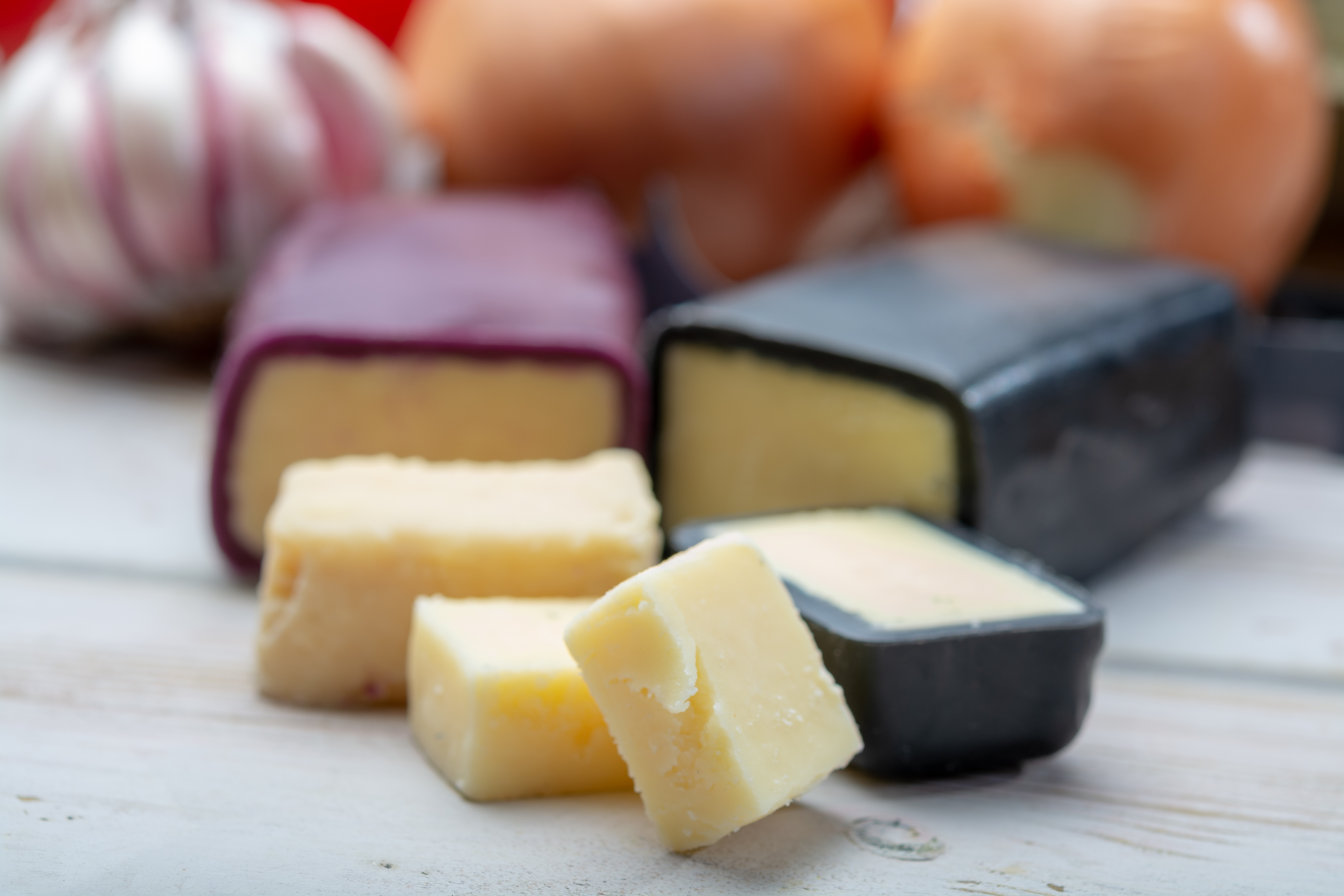
Don’t underestimate the power of truckles
It doesn’t pay to be snobbish about waxed truckle cheeses, say insiders, particularly with demand for premium versions on the up. Cheese expert Charlie Turnbull says specialist cheesemongers should have “a ladder all the way from just above the supermarkets, up to the greatest artisan cheeses”. It is essential, he adds, to cater to a diverse customer base. Essentially – don’t cut off your nose to spite your face.
“There will be someone different on each rung of the cheese ladder, and you want to reach people on every rung. Truckles are part of that conversation. They’re a really good spontaneous purchase, they’re great for longevity, and they’re also really good as gifts. I can’t think of anyone who doesn’t like them. It’s a totally safe pair of hands and an easy win for the customer.”
Charlie notes too the attractive price point of truckles, at around £6 to £12 “which is bang in the gifting range”.
If customers enjoy that impulse truckle they’ve popped in their basket quickly, avoiding eye contact because they’re too shy to talk cheese, there is a high likelihood they’ll return, Charlie adds – either for a repeat purchase, or to venture into something new.
The key is to buy the best because “quality really does matter”.
Godminster was one of the first cheesemakers to craft artisanal waxed cheeses and Sarah Norris says this is an area of growth in the cheese world, as consumers spend more time thinking about the provenance of their food, with premiumisation key to this part of the market.
“There was a period of time 20 to 25 years ago when cheese that wouldn’t make the grade was put into wax as a means of finding a home for it. At that point some products had additives, but those were there to cover up the imperfections of those cheeses,” she says. “I’m confident we were the first premium brand to take a good quality cheese and put it in wax, and it has been organic from the start. We’ve never wavered from that ethos. We always use 12 to 14-month Cheddar across our range from one source.”
Cheaper, ‘novelty’ truckles, Sarah says have the effect of “slightly degrading” the market.
Godminster’s Jessica Kimber Holloway, adds, “Some will go for interesting cheese rather than quality cheese and make that their MO. It’s a shame, because it’s pushing, when we’re pulling.”
Sarah agrees with Charlie that some retailers don’t feel truckles deserve a place in the artisan sector, however “the public need to be the ones who judge this, rather than the cheese industry. The cheese industry can be a bit elitist which is kind of unfair, because there are some amazing cheeses from a lot of different makers, in lots of different formats. We have to be able to give consumers choice.”
“If your cheese is a good cheese, customers will come back,” Jessica says. “When it comes to waxed cheese, it’s a crowd pleaser. It’s something that’s going to appeal to a five-year-old as much as a 95-year-old. A lot of cheeses have complicated flavours which take a while to appreciate. There needs to be a bit of educating that you can still sell the crowd pleaser and it’s not undermining or selling out, or downgrading your cheese counter. You’re showing you have a portfolio of cheeses, and a range of different styles.”
Jessica also says, with Christmas buying in full swing, it’s worth remembering the value of waxed truckles for hampers. “They have a longer shelf life, and they have the wax for protection. It makes them a good option when curating a gift set or box.”
Clawson, best known for the production of cheeses such as Stilton and Rutland Red, has invested heavily in waxed truckles this year, viewing its new premium range as a futureproofing tool the business, tapping into an area of serious upward growth, especially with younger shoppers.
“We noticed that the volumes of cheese in the market aren’t going up, but that truckles break that rule and buck the trend,” says Clawson’s Heather Lewis.
“Through our own market research we saw a gap for very premium truckles offering flavours with a twist, but not so odd that people wouldn’t recognise them.”
The team spent a long time perfecting the recipes, and designing characterful branding that links to the ‘personality’ of each product – each having its own story, feeding into consumer desire to really ‘connect’ with what they’re eating.
“Our focus was on making sure the quality and taste was right,” Heather says. “We tried, for example, 40 to 50 Cheddars to make sure what we ended up with was bespoke, and different to the market.”
Heather hopes this level of care, attention and quality resonates with speciality retailers who she, alongside Charlie, Jess and Sarah, thinks can be too quick to make assumptions about waxed cheeses can offer.
“What’s inside matters. We understand there are some cheese purists who will never want to try waxed truckles, but there are lots of other people who do. If retailers don’t have a premium truckle range, they are missing out. They are an excellent touchpoint cheese that’s accessible to everyone, and we are seeing a real demand for convenient, prepacked cheese people can pick up to take to events or to use for parties.”
Standing up for ‘real cheese’
Launched earlier this year, The Real Cheese Project is on a mission to help consumers and retailers understand what ‘proper cheese’ is.
“While a concrete definition may be elusive,” says co-founder Sam Brice, “everyone seems to agree that real cheese is important, special and worth getting behind – involving handmade craft, local milk, better farming and a real sense of place. Britain is a nation of cheese lovers, but most of these people are only scratching the surface of the nearly 1,000 incredible artisan cheeses currently being made here, so there’s a challenge and huge opportunity in front of us all.”
So much of what makes artisan cheese great aligns well with the interests of today’s conscious consumer, Sam adds. “So the more they can understand about what each cheese has done for healthier soil, increased biodiversity, food heritage, farming families and local economies, the easier it will be for them to justify the higher price tag carried by the exceptional and diverse cheeses that grace Britain’s cheese counters. “
At events this summer, the team say they have discovered many people ready and waiting to embark on a cheese adventure. “At Chiswick Cheese Market in May, we introduced the crowds to British territorials during Round One of People’s Cheese 2024 – our cheese competition voted for exclusively by the public,” says Sam. “They were blown away by the breadth and quality on show in each territorial heat, and turned on to what’s out there for them at cheese shops across the country.”
The Real Cheese Project, exists to celebrate artisan cheesemakers, support independent cheesemongers and “get more people buying the good stuff”.
“Only a tiny percentage of annual cheese sales in the UK is made up by artisan cheese, so we’re on a mission to change this,” adds Sam. “British cheese is enjoying a golden age, in terms of both craft and creativity, but if the majority of consumers don’t understand what goes into it – or that it’s even out there – then we’re under threat. It’s time to stand up for real cheese and talk to as many people as we can about what makes real cheese so special. It can start with a question; ‘what does real cheese mean to you?’.”
Time to educate consumers about regenerative farming
“How our food is produced is under the spotlight more than ever, so as the regenerative movement continues to gain momentum, we know it’s crucial to take consumers on this journey with us,” says Leona Mcdonald of Golden Hooves.
Leona says the brand’s recent consumer surveys confirm shoppers are more likely to purchase eco-friendly products, with 25.1% of those asked stating sustainable credentials are one of the most important factors in choosing a dairy product. But, most importantly, these claims need to be trusted.”
Quality and taste remain at the top of shoppers’ lists, Leona continues, noting commitment to sustainability and animal welfare have the potential to be a big factor in purchasing decisions, illustrated by 77.5% of survey respondents saying they would be more likely to buy dairy products made using regeneratively farmed ingredients.
“We’d like to move the conversation onto the next stage from ‘where was it farmed?’ to ‘how was it farmed?’. Opening up these discussions and consumer awareness of the difference is vital when considering that the lot of the planet, animals and people should all be enhanced by improvements to agricultural food production,” Leona says.
“The future of our farms and the nation’s food security, including the stability of milk supply, are all reliant on what we do today. This means paying a fair price, while encouraging better and better farming practices. Social consumerism is here to stay.”
